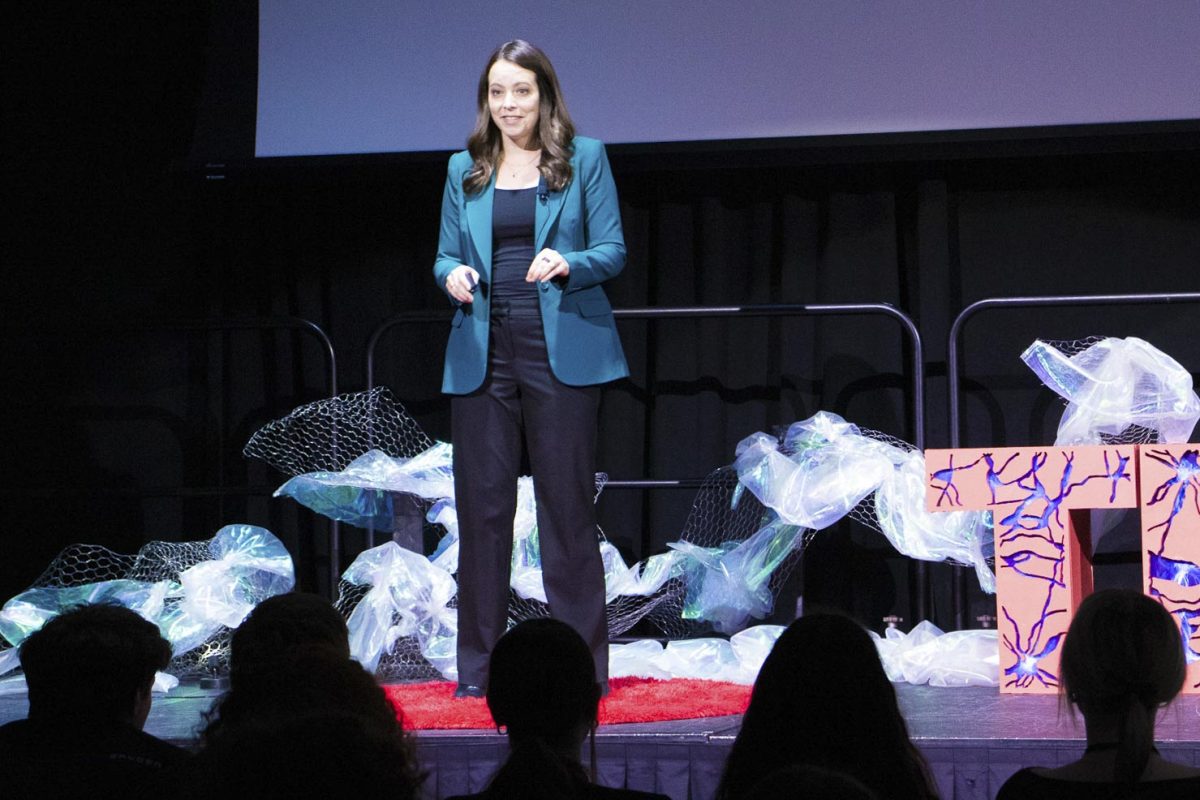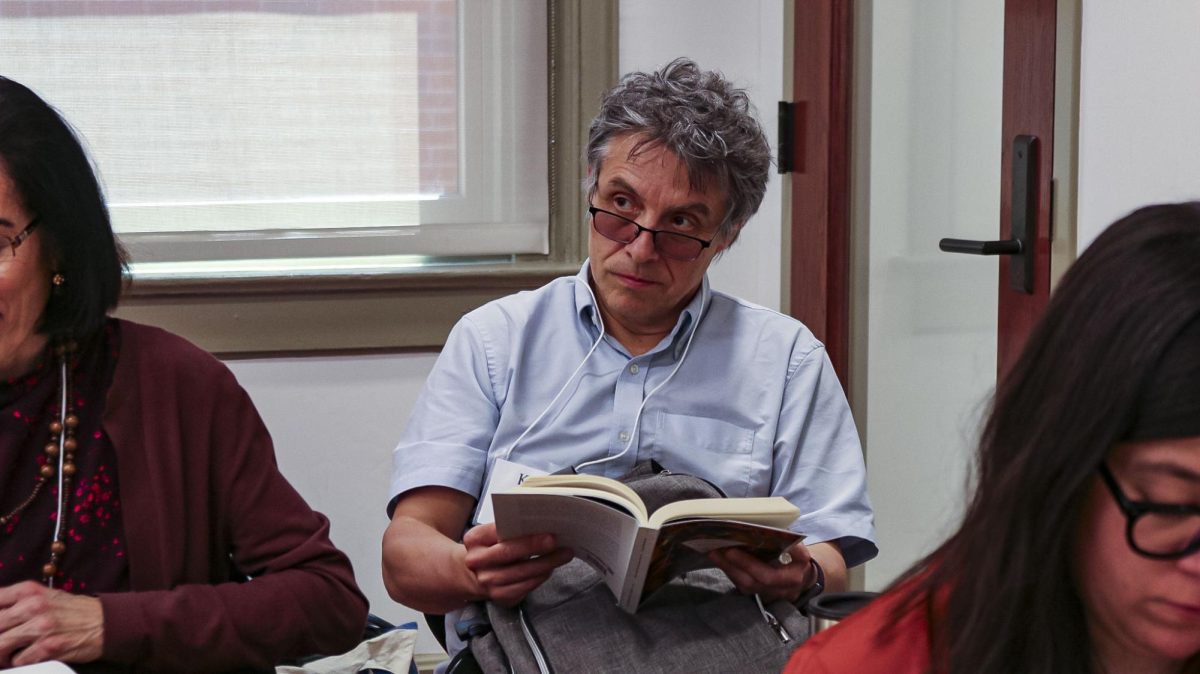The University of Kentucky held TEDxUKY “Mosaic Minds,” an event focused on educating students and community members on a variety of topics presented by professors and field specialists.
Fully organized and led by UK students, the event had two segments featuring TED Talks about topics such as geohazards, sexual violence and grief at the Gatton Student Center on Tuesday, March 25th.
Debora Pena, event organizer and psychology junior, said she believes UK’s campus is full of ideas worth sharing, saying many ideas are “hidden” within UK’s community that can help people move forward.
Pena said the idea behind the event’s theme, “Mosaic Minds,” was to show how individuals all have small “pieces” from different fields and that they can be unified into a meaningful “mosaic.”
“All the topics (discussed at TEDxUKY) can easily be relevant in your own life, even the ones that may not relate to you directly,” Pena said. “Open your head to be more acceptable of people. Having an open mind is incredibly helpful.”
Amia Carter, freshman psychology major and host of the event, said she believed the topics discussed during the event were meaningful to speak on.
“I think there are things that we may not think about on a day-to-day basis that take us out of that normal thinking and bring us into deeper, more intentional thoughts,” Carter said.
Adria Thompson, speech-language pathologist and lecturer at Eastern Kentucky University, was the first to speak at the event and gave a TED Talk titled “Why We Should Talk About Dementia.”
Thompson discussed why providing dementia patients with appropriate care catering to their needs was “extremely relevant” to the elderly community.
According to Thompson, the passion of her peers for their fields of study motivated her to be just as passionate about hers.
“Even though I know nothing about many of these topics, you can just feel their passion,” Thompson said. “I think our passions unite us all.”
Marc Cormier, associate professor at the Department of Kinesiology and Health Promotion and Director of the Sport and Exercise Psychology Graduate Program at UK, delivered a speech about recognizing factors that impact athletic performance, including the formation of social relationships.
Cormier’s speech was followed by Department Chair of Civil Engineering at UK Sebastian Bryson who delivered a TED Talk titled “When The Earth Moves.”
Bryson discussed the aftermath of climate-driven floods and new technology as a response system to combat landslides and other geohazards.
“Geohazards, like landslides and floods, are a major concern in Kentucky because of millions of dollars for damage and injuries,” Bryson said. “It is a need force to address.”
According to Bryson, students should be interested in the topic of geohazards because they affect the present and the future.
“The call to action is first and foremost to learn more about what’s going on,” Bryson said. “Get involved in these types of activities, such as humanitarian activities, to help those individuals that have been affected by the floods and landslides.”
Kelly Doychak, interior design senior and member of the event’s stage design crew, said she believed having an array of topics for students to address could begin important conversations.
“Other students should care because it pertains a lot to us and our future,” Doychak said.
The second segment of the event began with discussions involving topics such as overcoming grief and sexual violence.
Stephen Seidel, motivational speaker and founder of The Seidel Agency, talked about the empowerment that comes with grief.
“I transformed grief into a greater purpose,” Seidel said. “To reconnect, to rebuild and to reclaim my power.”
Seidel said he struggled with overcoming his mother’s passing, as well as his journey through grief.
“I needed to let grief guide me, not divide me,” Seidel said. “Get out of my head and into my heart.”
Seidel said the importance of building a support system and creating meaningful relationships provided a chance for him to be vulnerable.
“It takes time, but when we accept the cards that we get dealt and we lead with love instead of folding from fear, we can rebuild one day and one step at a time,” Seidel said.
David Hague, director of UK’s Community Mental Health Clinic and psychologist, talked about “deconstructing” the stigma attached to non-monogamous practices in his speech “The Possibilities of Polyamory.”
“Romantic love is this idea in our society that you give it to one person and you never let anyone else have any of it,” Hague said. “We are socialized to see romantic love in one way.”
Hague said his clients viewed love as an “abundant, expandable resource.”
“This idea starts to change that image of romantic love that we were raised with,” Hague said.
Christal Badour, psychologist and co-founder of UK’s Clinic for Emotional Health, discussed victim blaming and myths regarding sexual violence in her speech “Shattering the Silence to Dismantle Rape Culture.”
Badour said she worked towards honoring sexual violence survivors and their experience, as well as being able to speak directly to them and other people who love and support survivors.
During her talk, Badour discussed the relevancy of listening, believing and supporting survivors.
Badour said many of the topics discussed by her colleagues during the event were important for people to appreciate and change interactions with others.
“Every talk tonight is relevant to the experience of college students,” Badour said. “Because they’re all about the challenges that people face in life and how they persevere through them, and how they’re all things that impact you at one point or another in life.”



































































































































































